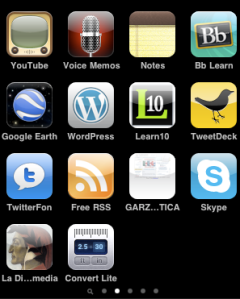Students took their midterm exam on October 25. Meteorological phenomena stopped northern New Jersey in its tracks for a week: power outages, commuter interruptions, and gas shortages all played factors in our institution’s decision to keep the University closed until November 5th. Despite the wonderful ways in which technology kept us connected throughout the worst parts of the superstorm (read this great post wp.me/p2hiSW-ib /), I couldn’t impose technology on my students to keep them practicing Italian. Even if 75% of students had access to the Internet and various other technologies, trying to continue “business as usual” (via online tools) was not an option. Anyone who experienced the impact of the storm understands this.
So 14 days later, how does a language professor proceed? Which of my students, given the events they had just experienced, would be able to recall talking about past events in Italian, recalling the conjugations of the tense, the difference between transitive and intransitive verbs, and irregular past participles? I tapped into some creative juices and I decided to that playing would be a good way to reintroduce them to the classroom and the language after an unexpected absence.
The game: Tombola (Bingo equivalent)
The main board (il tombellone): I provided students with a list of 40 activities (which I would use as caller) that they may have done during the aftereffects of the superstorm. The question to them was “Since the university was closed, what did you do?” There were a list of daily activities, including getting up, getting dressed, showering, sending text messages, chatting, sleeping, as well as looking for gas, grocery shopping, online shopping, relaxing, being bored, etc.
Students were given a blank board, resembling an Italian cartella rather than the Bingo game card. 
Students were then asked to fill in 5 of the 8 spaces per row, and shade in 3 per row (like free spaces). They were allowed to use any of the 40 activities in any order. The only requirement was they phrase it in the present perfect. I modeled a few of them… “Io ho bevuto molto vino” and “Io non mi sono depilata perché sono stata a casa”. In addition to getting a few laughs, I modeled both transitive and intransitive verbs. It started the recollection process for many of them. As they completed their game card, they helped each other recall vocabulary and verb conjugations.
Once they had completed their first task, I had shared with them the rules on how to win. I asked what they knew about winning in Bingo. Students told me (in Italian) that it was getting a line horizontally, vertically or diagonally, and also the whole card. I wrote the words terno, quaterna, cinquina on the board. I asked them how many spaces they needed to get in a row to win. They recognized the number base in each of the words, and so once it was clear, the game began.
I called out each activity; I had each activity on a slip of paper and pulled them out randomly from my bag one at a time. I formed a question (Chi ha dormito molto? Who slept a lot?) and students marked their card and some even raised their hand if they did the activity. If they shouted terno, quaterna, cinquina, they were required to read out their activities to the entire class and I would confirm the win (or in a few instances, tell them they hadn’t won!). We played until all 12 prizes had been won. When we were close to the end of our activity, students were anxiously calling out the activity they needed for a win.
This entire activity took about 35 minutes (of a 75 minute class) from start to finish: 2 minutes to introduce the activity; 10 minutes to write out their 15 activities on their game card; 3 minutes to explain how to win; then 20 minutes to play and verify their win.
Students were excited, engaged, and had great fun. Their disposition had changed dramatically from the start of class to the end of it. They walked in with heads hanging low as a result of the superstorm and snowstorm (which was the day before, on Nov. 7). For a little while, they were able to forget about it by reviewing, practicing and playing in Italian. Playing Tombola helped also transition into the next part of the lesson, which introduced new material via an Italian song.
This isn’t part of the regular curriculum…perhaps games should find a more regular place in our teaching, even at the university level.


